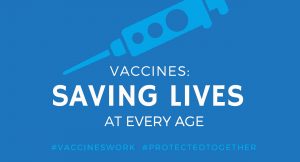World Immunization Week 2018: Vaccination in at-risk groups
 This week is World Immunization Week (WIW) with the theme of "Protected Together, #VaccinesWork." World Immunization Week is a campaign led by the World Health Organization (WHO) which highlights the “importance of community” in establishing herd immunity, increasing vaccination education and uptake, and countering vaccine hesitancy.
This week is World Immunization Week (WIW) with the theme of "Protected Together, #VaccinesWork." World Immunization Week is a campaign led by the World Health Organization (WHO) which highlights the “importance of community” in establishing herd immunity, increasing vaccination education and uptake, and countering vaccine hesitancy.
The International Federation on Ageing (IFA) believes that vaccination in at-risk groups - including older people and people with cardiovascular diseases, cancers, diabetes and chronic lung diseases – is an important area of focus, as vaccination has the potential to mitigate higher rates of morbidity and mortality in at-risk populations and enable those who are vulnerable to age in better health.
According to the WHO, non-communicable diseases (NCDs) are diseases of long duration and generally slow progression that are not caused by an infectious agent (i.e. not transmissible). Many older people have dual disease burdens of NCDs which increase their likelihood of experiencing complications due to influenza, pneumonia or shingles.[i] The convergence of NCDs and infectious diseases presents new challenges and new opportunities to enact responsive changes in policy and research.
Vaccine preventable diseases have serious and often life-threatening costs for older people with an already weakened immunity that are often magnified by chronic co-morbid conditions. Laying the groundwork for healthy ageing begins long before one thinks about growing older, and vaccination is identifiable as a key component of this work, especially for vulnerable populations.
In honour of WIW, and in line with the theme of building community, the IFA has collaborated on a joint statement on the value of life course vaccination with several partner organisations from the World Coalition on Adult Vaccination, who are doing important work vaccination.
Follow IFA’s @vaccines4life Twitter account.
[i] Jung, Hee-Won, and Kwang-il Kim. "Multimorbidity in older adults." Journal of the Korean Geriatrics Society 18.2 (2014): 65-71.


